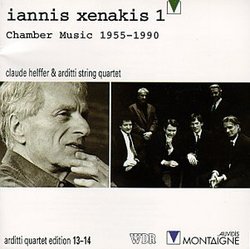Classic Xenakis in a changing world,ferocious/gentle playing
Rachel Abbinanti (tusai1@aol.com) | Chicago | 06/08/1999
(5 out of 5 stars)
"All the great Xenakis pieces are here from different points in his life. It was someone's plan to have the young and the not-so-old Xenakis with points within the same genre here like the two string quartets and the cello and piano solos.The piano solo"Herma" when written in 1960-61 was considered utterly impossible to play.A mere 9 minutes of unrestrained frenzy,of changing, shifting registers,somehow Xenakis thought of different voices emerging spatially. His latter piano solo music engages more concentrated densely packed structures continuously unfolding like some uniterrupted part of nature gone bad, as in "mists" Also"evryali" which means something of a frenzy and has become the pianists balloon trip around the globe.Helffer seems to work better at this music than the older Schoenberg generation repertoire I've heard him play. He has a light unarrogant touch,going for the brightness of sound. The cello solos are great here as well by a premiere Xenakis interpreter Rohan de Sarem,who really has been in the Arditti shadow too long, Here in "Nomos Alpha"(another early work 1966) was the high point of computer usage,but for Xenakis it was all a means toward creating his endpoints his music of primordial affinities. Xenakis if you ever read him in interviews maintains an aesthetic that praises the naturalness of sound constitution,how a graphic image can portray sound. "Nomos" is a great example of that, with rugged resonant plucking mixed with quarter-tone moments acting as stopping points within the unceasing momentum, the glissandi as well and the double stops sounding like a B-52 about to take off.The violin solos "mikka" a mere 4 minutes is from 1971 and Arditti here is a great Xenakis player. The most difficult aspect of playing any Xenakis is that your traditional performance experiences doesn't help you. You need to start from scratch,knowing that there is another form of tone production and alternate concepts of what constitutes a beautiful tone.The solo violin piece"mikka" exploits the various glissandi, in fact it is a one-idea piece,Arditti reveals an impassivity as if his instrument and sensibility is a mere conduit for an abstract structure of sound."Tetras" for string quartet is simply one of those works which seems to transcend whatever the composer had in mind. This work seems like music you have never heard before in any way. It inhabits its own gestural sonic world, moving at once a slow then fast pace. You never sense that is it a string quartet,merely a body of strings. All seem to collapse into one sound. But here Xenakis focuses on the smaller particles of sound, as opposed to the "clouds" and "mists" of sound conceptions he is fond of. You never sense a beginning,middle or end. The cello solo"Kottos" is a leathery sounding excursion into repetition,unrelenting brutalized momentum. These qualities inform much of the latter solos Xenakis has written."
Amazing and impressive!
Jung, Sung-Young(syjung@lgcit.com) | South Korea | 11/24/1998
(5 out of 5 stars)
"Amazing sound! incredible performance! I cannot imagine how such a exquisite sound can be performed with string intruments. I never heard such a marvelous sound, It is unforgettable experience. I think that the title work, "Tetra", is most amazing and worth to be evaluated as new musical revolutionary works. It is also amazing that all works are based on mathematics such as statistics, stochastic process, group theory... This CD shows that Xenakis's contribution to make connection with mathematics and music."


 Track Listings (9) - Disc #1
Track Listings (9) - Disc #1